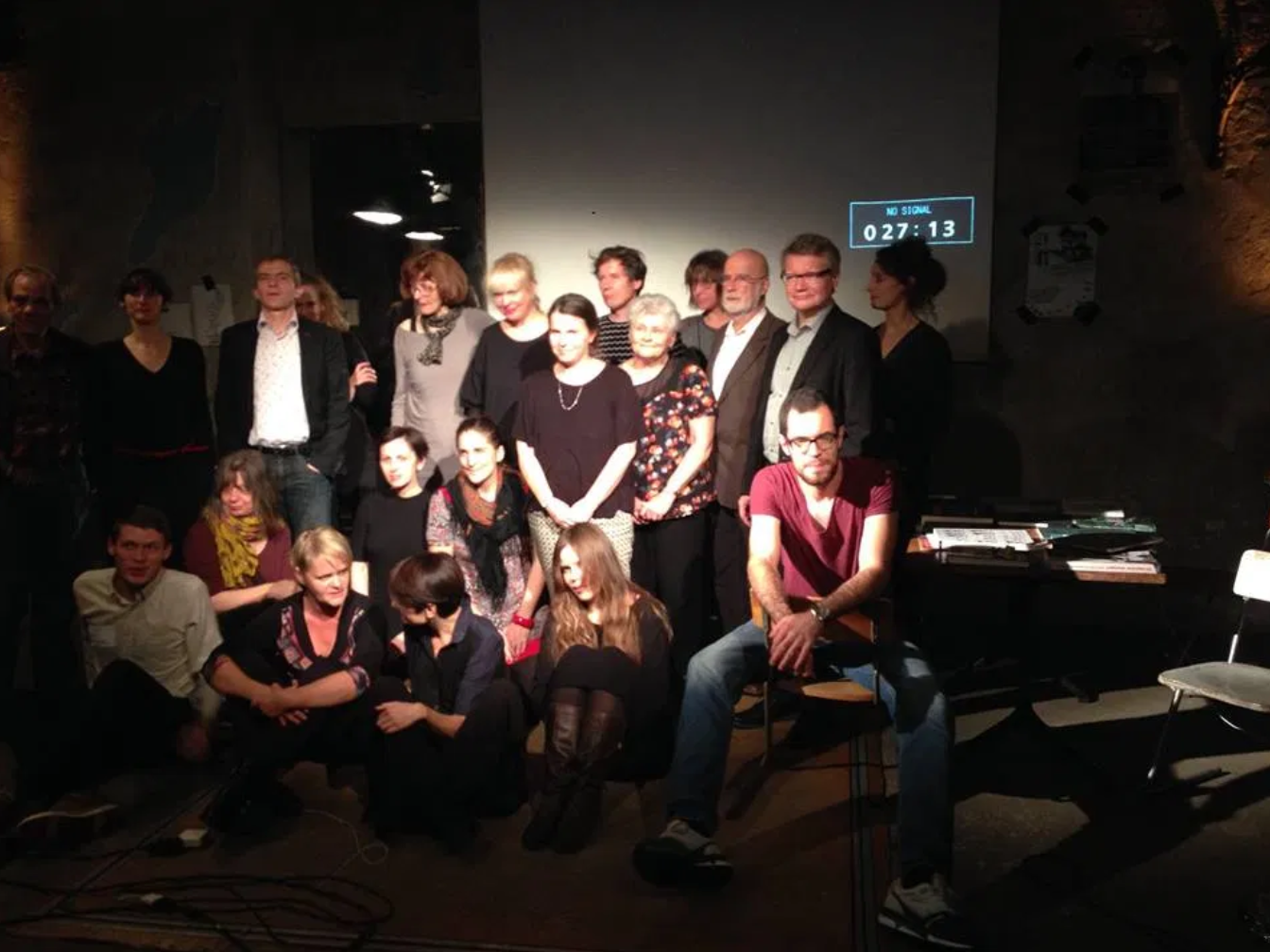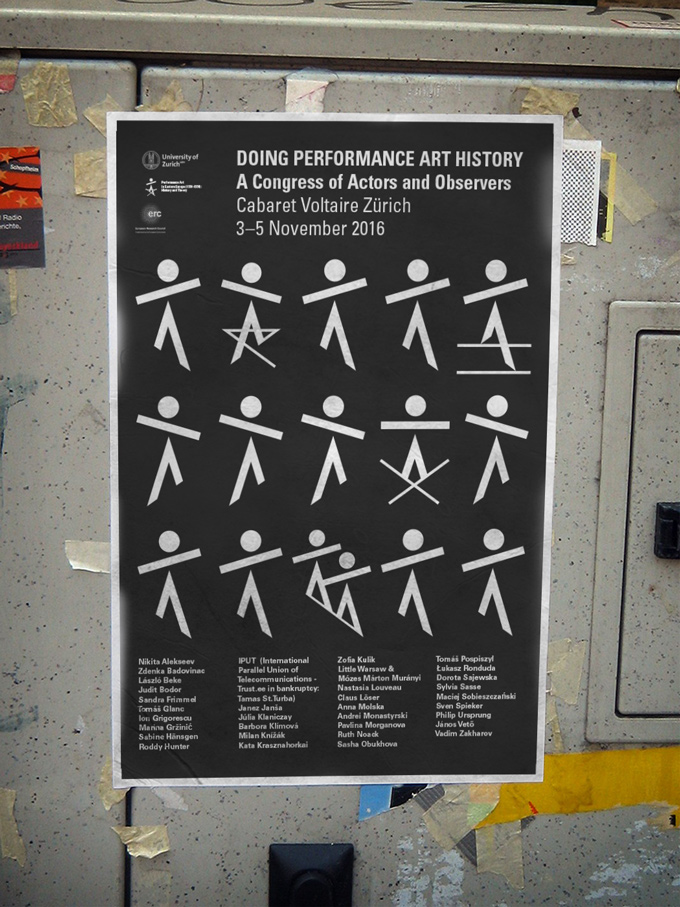Doing Performance Art History: A Congress of Actors and Observers
Date: November 3-5, 2016
Venue: Cabaret Voltaire
Conférenciers: Little Warsaw & Mózes Márton Murányi
Self-documentation, self-archiving and self-theorization as part of the artistic process played a decisive part in the development of Eastern European performance art. In Eastern Europe, the documentation of ephemeral events took on a very special meaning. Not only did it reflect, as in the case of Western performance art, the problematic nature of passing on traditions of actions, happenings and performances; self-documentation was moreover a strategic means of compensating for having been partially excluded from the general public and the mass media within society. In this context, artists were compelled to assume functions that otherwise undertake contemporary art critics and academic art historians. The artists in Eastern Europe became their own archivists, critics, curators and historians.
The strategies developed by performance artists, the orientation towards the event itself, and the focus on the aspect of action (on ‘doing’) pose a challenge to art historiography (art history, its institutions, and its concepts). Eastern Europe provides us, then, with a superb example of a performance art history that understands itself as a 'doing', as not only a performative, but also an artistic act.
Our congress focused on those strategies, both past and present, employed by artists, critics and academics in order to create a performance art history. Among these are methods of documentation (photography, film, video, sketches, comments), of collection, archiving, writing, mapping, and re-enactment. Who were or are the actors? What were or are their concepts? How was performance art at the time of the Iron Curtain documented, archived and collected, and how are these documents historicised today? Which theories of collection, archiving and documentation can be deduced from these artistic or academic processes? To what extent does the composition of these processes differ from country to country, and which conceptual commonalities may be carved out among them? How can we describe the interrelationship between artists, curators and academics for the art history(ies) of today, and therewith, the interrelationship between participation and observation, proximity and distance?
Although we pursued these questions as they pertain to Eastern European performance art, we understood this congress likewise as contributing to a broader, general performative history of performance art since 1950. Among those invited was an assortment of illustrious figures of the performance art world from both the east and west: artists, curators, critics and academics.
More information on the following site: http://www.performanceart.info/doing-2016/
Programm
Thursday, November 3
| Time | Speaker and topic |
|---|---|
| 18:30 | Introduction by Sylvia Sasse: "Doing Performance Art History" |
| 19:00 | Philip Ursprung: "'Zerreissprobe': Performance in the Cold War" |
| 20:30 | Film Night I Łukasz Ronduda, Maciej Sobieszczański: "The Performer" |
Friday, November 4
DOCUMENTING
| Time | Speaker and topic |
|---|---|
| 9:30 | Introduction by Sabine Hänsgen: "Media of Documentation" |
| 9:45 | Art Works I |
| 10:15 | Júlia Klaniczay: |
| 11:00 | Judit Bodor/Roddy Hunter: |
| 11:45 | János Vető: |
Lunch break |
|
| 14:30 | Tomáš Pospiszyl: |
| 15:15 | Marina Gržinić: |
Coffee break |
|
| 16:30 | Vadim Zakharov: |
| 17:15 | Art Works II |
| Coffee break |
COLLECTING / EXHIBITING
| Time | Speaker and topic |
|---|---|
| 18:00 | Introduction by Tomáš Glanc: "Display Performance" |
| 18:15 | Ruth Noack: "Tales from the Past? When Artists Were Posing the Self against a Political Other" |
| 20:00 | Film Night II Claus Löser:"'Smashing the Black Box‹ – Independent Film and Performance Art in 1980s East Germany" |
Saturday, November 5
COLLECTING / EXHIBITING
| Time | Speaker and topic |
|---|---|
| 10:00 | Zdenka Badovinac: "Arteast 2000+ Collection and its Use" |
| 10:45 | Sasha Obukhova: "Keep Acting: A Performative Exhibition Which Pretended to be Academic" |
| 11:30 | Art Works III Milan Knížák:"Slide-Show" |
| Lunch break |
DOING THEORY / THEORIZING
| Time | Speaker and topic |
|---|---|
| 13:30 | Introduction by Sylvia Sasse: "Performance Art (as) Theory" |
| 13:45 | Pavlína Morganová: "Performance Art – Remembered, Described, Interpreted, Photographed and Filmed, Sometimes even Reenacted" |
| 14:30 | Nikita Alekseev: "Low Performance" |
| Coffee break |
ARCHIVING
| Time | Speaker and topic |
|---|---|
| 15:00 | Introduction by Dorota Sajewska: "Performance of the Archive" |
| 15:15 | Art Works IV Zofia Kulik: "The Archive Cultivation" |
| 15:30 | Sven Spieker: "Manifesto for a Slow Archive" |
| Coffee break | |
| 16:45 | László Beke: "Memories of a Witness/Art Historian/Archivist/Conceptor" |
| 17:30 | Art Works V IPUT (International Parallel Union of Telecommunications – Trust.ee in bankruptcy: Tamas St.Turba): "Portable I2 Museum – Pop Art, Conceptual Art and Actionism in Hungary during the 60s (1956–1976)" |
| Coffee break |
RE-PERFORMING
| Time | Speaker and topic |
|---|---|
| 18:15 | Introduction by Kata Krasznahorkai: "Performances Never End – and Never Begin" |
| 18:30 | Barbora Klímová: "An Inspiring Misunderstanding" |
| 19:15 | Janez Janša: "WHAT DO WE ACT WHEN WE REENACT? Mount Triglav on Mount Triglav on Mount Triglav" |
| 20:00 | Anna Molska: "Constructing the Archive" |


